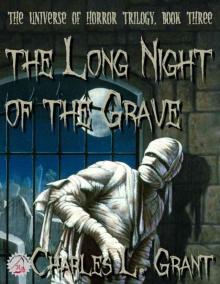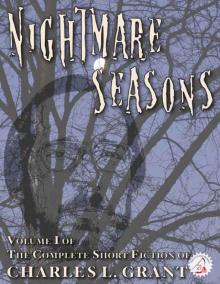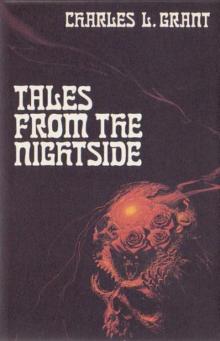- Home
- Charles L. Grant
The Curse Page 8
The Curse Read online
Page 8
The two armies, the members of which changed sides at any treacherous temptation, ranged up and down The Lane, picking up children, the Traubs and, just before dark turned the snow gray, an unwilling William who had spent the day cleaning his tavern of the aftermath of the midnight celebration.
"Hey," Pegeen said, as she and Terry ducked a barrage of snowballs and squeals, "who belongs to the girl?" She nodded toward the brown-and-white colonial opposite them.
Terry looked at the unmoving figure on the porch. "That's William's wife," she said. "None of this nonsense for her, so I'm told. She hardly ever leaves the house except to go to the store."
"She must think we're nuts."
"Aren't we?"
"Speak for yourself, big sister," she said. "I've just changed sides."
A fortnight later, the dream and the calls were pushed to topics for cocktail parties. Esther and Ruth Traub offered Pegeen a room in their home and were refused politely. Syd had a choice of losing his job or taking a cut; his last bonus was spent on a battered Franklin stove they shoved into a corner of the laundry room until they had the time and money to repair it. When it became apparent that Terry was not about to make further use of the downstairs room, Pegeen talked Syd into allowing her to use it until she could locate a job and a more permanent address. To Terry's surprise, he'd acquiesced with only a token struggle, and the women immediately launched a scavenger campaign to furnish the room. Using Ruth's station wagon, they struck at rummage sales, auctions, and a warehouse clearance, from the last uncovering a sofa bed and a pair of golden drapes that fit the glass doors perfectly. They polished the paneling, washed the walls, and Terry began to feel envious.
Syd found a lock for the doors and gave the only key to Peg. "You want to mess around," he said, "just keep the noise down."
By the end of the month there had been no calls from Vic, and one afternoon Peg shocked Terry by saying she had visited a lawyer the previous week.
"You can't do it, Peg. The Church won't allow it."
"The Church? When was the last time you went to Mass, Ter? Never mind, that's none of my business, but the last time I went was when I was married."
"But what would Pop—"
"He's dead, Ter, and I'm not about to let the best years—"
Terry nodded an abrupt interruption. The completion of the cliché was unnecessary.
"Listen, Terry, he's running too fast, and I'm not about to run with him. We tried all that and it didn't work and now it will be done. If he's not there already, by summer he'll be back in Ireland."
"Oh, Peg. . . ."
"So what should I say? It's over, right?"
"He's still your husband, sister."
"More like my son, I think," and Terry immediately dropped it, less shocked by the first divorce in the family than by her own instance of hypocrisy. And there was guilt for throwing the Church in Pegeen's face when, in fact, neither she nor Syd had found the Church comforting enough nor contemporary enough for their own particular problems. God was around, they'd decided, but living in another, more exclusive neighborhood.
Easter to April and the rains of spring. The painters were out. Syd brightened their own white trim, borrowed a trick from Jim Griffith and brushed away the dirt of winter from the cedar to keep the aging brown gleaming.
He was working on the eaves over the porch while Terry sat on the stoop to offer him moral support and a thermos of coffee. Over the hedge she could see Denver balancing on a scaffold at the side of his house, using a wire brush on the window frame's peeling paint. He turned once, and she waved, called him encouragement. He returned the wave, turned back to the house, and, suddenly, while Terry stood and screamed, toppled from the single plank and grabbed for the ropes that locked it in place. By the time she could move, Syd had already jumped from his ladder and was racing across the street. She followed, watching as McIntyre hung from the rope, then began to slide rapidly to the ground. By the time she reached him, he was leaning on Syd and breathing heavily.
"Denver. . . "
He grinned at her. "A beautiful woman will do that to an Indian all the time."
"But—" and she reached for his hands to check the rope burns.
"Nothing," he said. "We're also damned tough."
"That could be," she said to Syd later, "but his hands weren't even warm!"
"Terry, shut up and hold the ladder, okay? Tarzan I'm not, you know."
"But shouldn't he have been burned or something?"
"Darling little girl, the rope was smooth and his grip was strong. Now hold the ladder, please?"
Terry tried to interest the neighborhood in standing watch at various hours during the night to find the driver who was continuing to strike down small animals and leaving their bodies crushed at the curbs. Either out of guilt or disinterest, however, only the Traubs responded, and, after the first week, the project was abandoned for a good night's sleep.
The Golly books were ordered out of print, and Terry wept as though a child had died.
Pegeen, more from Syd's gentle prodding than her own volition, found a job at Pritchard's store, and an apartment in a complex still under construction two miles down Hawthorne Street. It would be ready by summer's end, she was promised, and Terry instantly initiated plans for revitalizing the basement room and grafting it onto the life of the house.
The meadow, meanwhile, more than fulfilled Enfallo's promise. Once the last of winter had retreated north, green replaced white as the neighborhood color, and the sounds of the world changed.
The children exploded from their indoor confinement as if school had already ended, and new lawns had to be protected by small stakes and lengths of string with dangling cloth strips. Syd discovered a green thumb and unleashed self-proclaimed talent in a torrent of seedings, weedings, rakings, and fertilizings. Quickly, too quickly for Terry's taste, he blended into the Saturday morning rites with an enthusiasm he'd usually saved for denigrating his employer. When she reminded him of his attitude toward the urban male's complex toward a lawn, he announced he had discovered the Wonders of Nature that lay dormant beneath the rotating blades of a three-horse mower.
She was forced to concede him the fresh air he seldom had before, but took to standing at the living room window and watching as he crawled around the edges of the driveway, searching out each stray new blade or old weed as though it were an ancient enemy. And often, the McIntyre twins would coax him into a game of catch or touch football, and if either the Dormen girls or Bess Griffith raced by after their loose and running dogs, he was the first to join the chase. He filled out, toned down and, she imagined, with the coming of summer would turn darker than Denver under the hot sun.
Pegeen became scarce. In taking the job at the store, she discovered something she'd never known she had; an innate ability for organization and display which the old man exploited at a disturbingly low wage. Whenever Terry brought that to her attention, Pegeen said it would be great practice when she opened a store of her own, and besides, she and Pritchard were too close as friends for her to be complaining about salary.
"I've got it all planned, sis. Once I learn all I can from Alec, I'll move on to something bigger. By that time I should have enough money and savvy to try it on my own."
"Brother, I can see it now; when you're ninety-nine, you'll be called Old Peg and you'll sit behind a counter with an ass as broad as a chair and twice as heavy."
"Don't knock it, Terry. It's better than sitting home all day."
She walked slowly across the field, angling toward the gentle, cowl-like slope where she'd first seen Denver and the boys. Denver and the boys, speaking as though they were his sons, not William's, as if Mary did not exist except as a painting over someone's huge fieldstone fireplace. Mary and William, she decided, were figments of her imagination, as was the elder. It was a peculiar situation, this McIntyre household, and she'd long ago concluded it would be useless to attempt an understanding. Most likely, it had something to do with their Indian
background, but since she'd never found the nerve to ask, she decided she had no right to even speculate.
The grass was already tall, moist as it brushed her sandaled feet. Wildflowers newly bloomed. Birds flew in flocks from the state park forest. She moved carefully, successfully avoiding most of the rocks shoved edge up by winter, hidden depressions and burrows' entrances scattered among half-buried, rotting logs—the carefree sprinting of a romantic young woman was decidedly too dangerous and she walked instead, carrying sketchpad and box of charcoal.
And Pegeen had been right, depressingly so. Since the turn of the year, Terry had been unable to establish a single contact in the city. Several times she'd locked herself in the study for over a week to organize a new series of illustrations Madeleine had sent her on speculation; and each set had been returned with regrets for the wrong mood or the wrong coloring or the wrong level of sophistication for the purpose of the book. Once a week during March she rode with Syd into the city and made the rounds with credits and portfolio, and after each footsore excursion, she'd cried, while Syd tried to soothe and drive simultaneously.
"It's over!" she dramatized on Sunday after dinner.
"You've been saying that all week, angel. You take longer to die than Camille."
"Well, it's true, damnit. I'm a has-been before I'm even thirty."
He'd laughed and pulled her unwillingly down to his lap to nuzzle her neck and tug at her braid. "Listen," he whispered, a hand stealing across her stomach, "soon enough we'll do something right, conjugal wise, and you'll be up to your easel in diapers and pacifiers. Meanwhile, how about clamming that self-pity and either stick it out the window for the squirrels to get fat on, or do something on your own. God knows you've talked about it often enough. And after all, has-been, how hard can one-syllable words be anyway?"
Too damned hard, she'd wanted to tell him but neither could she surrender what had suddenly turned into a crusade for self-preservation.
"Hey, Mrs. Guiness, look out!"
Terry took a step, then jumped back and saw the tiny houses scattered at her feet. They were clumsily woven of new grass and twigs, and only the various toy soldiers and Indians deployed around them let her know exactly what they were supposed to be.
Karen Dormen, still calling a warning, charged down from the top of the slope, her boy-short blonde hair puffed by the wind. Her younger sister tagged behind her, and the two gently eased Terry away from the scene of the pretend battle. Both girls were overweight, looking heavier under their jackets, and they were liberally covered with grass stains and dirt; from no distance at all they could easily have been taken for boys.
"Sorry," Terry said. She knelt to look closer at the village. "Don't much care for dolls, huh?"
Val, her cheeks swollen with gum like a chipmunk, made a noise of disgust and blew a large pink bubble she burst with a dirty finger. Karen only shook her head and sat on her heels, pointing at the sketchpad. "You going to draw our pictures?"
"Sure, if you like."
"No. I don't want to look like those silly kids in your books. My mother keeps telling me to thank you for them. They're nice. But I don't want to look like them."
Terry smiled, was careful not to laugh. "Well, look, I know just what you mean, Karen. But those were for little kids. If you let me, your picture will be more grown up."
"Will we be in a book?" Val asked as she flattened two houses with her palm.
"If you like."
"I don't."
"Me neither," Karen said. "I don't want to be famous. I just want to be a baseball player and make lots of money."
Toy soldiers and baseball. Terry wondered if her own daughter—to be born when she was one hundred, the way things were going—would be like the Dormen girls and accumulate scars and home runs instead of dolls, or would the world ever retreat to the simplicity of rag dolls and taffeta. It would certainly be a lot less complex, she thought, standing and backing away from the game that did not include her.
The girls began arguing about procedure, snatching the toys from each other and repositioning in the spring soft ground.
Terry watched a moment longer, then turned back up the slope which, she realized, was longer than she'd imagined, almost too gentle to be recognized as an incline. When it finally leveled, she was on a well-trampled area nearly thirty yards in diameter and empty of the flowers that dotted the green surrounding her. She was facing The Lane, directly in line with the end of the street; and through the brilliance of newly green leaves she could see patches of houses that would be invisible by June. And as The Lane was blunted by the phalanx of birch, so did the meadow separate the community and the wild. Far behind her was the wall of forest that marked the outermost reaches of the state park, a wall that scalloped the meadow's perimeter and encased it like a buffer between two species of chaos.
No street noises here; only the bees black and yellow, the quiet grunting of the girls still at their game below her, and the occasional sweep of flock of sparrows or the discordant scoldings of crow and blue jay. After a silent debate, Terry took off her worn black windbreaker and spread it on the ground. A quarter-turn for perspective and she sat, propping the pad on her upraised knees and sketching without concentration. Nothing in particular yet; whatever the wandering eyes of her fingers approved.
The tree line broken by a chimney or two. The girls flat on their stomachs, squinting realism into their armies. A pair of red-brown squirrels chasing through a pattern she couldn't discern, arcing their tails and bounding over obstacles like mating-dance rabbits. A single cloud, wisping and lost and eventually breaking into fragments like wandering smoke. There was no breeze and, as noon passed, the sun grew warm. She was aware of Val and Karen staring at her, becoming bored, and running with a unison shriek toward home.
Alone, she watched the images come faintly to life on the paper. Her eyes were quick in glances up and down, her left hand flipping the pages when something warned her to finish and continue. She split herself, allowed a single part to wonder at the uncompromising peace the meadow's solitude bequeathed her; far better by half than the study where the intrusions of subtle noises disrupted her vision. If she'd been aware the field held this much promise, she would have spent the entire winter bundling like an Eskimo, sitting on the hill and making her fortune. What she was doing now was good she knew; modesty in the face of failure was a luxury she could no longer afford.
But her fingers eventually tired, and her back and legs grew cramped from the forced sitting. Reluctantly, she set pad and charcoal aside and stood, stretching toward the sun, feeling her breasts, stomach, loins rise and relax.
Exploring, she told herself, is the best part of this day, and she walked toward the forest, stopping abruptly and with a gasp caught in her throat when she came to the far end of the top. She remembered how Denver and the twins had seemingly dropped off the edge of the world that afternoon in October. Now she knew why. As though a bulldozer had ravaged the western slope, the hill plummeted straight down at least fifty feet. There was still grass, but far more extrusions of boulder and huge rocks. Two steep paths exposed night-black soil and she decided this must be the daredevils' sleigh route, Everest, the moon, and a wall of Fort Apache. At the foot, the meadow lunged away table flat, the colors of its spring blurring into a unified flow like Caribbean waters.
Queen of the Hill, and of all she surveyed. Terry giggled and was about to chance one of the trails when she saw a low, piece of wood topping the high grass. It was shaped rather like a tombstone, she thought, and she could see rough markings in the weathered gray, gouged as though done with a knife. She knelt, shading her eyes against the setting sun while she strained to read what had been carved there.
"You can't make it out from here, Mrs. Guiness."
Terry was so startled she fell backward, her hands splayed behind her to keep her from going prone. A figure moved to the edge of the hill, and it was black in front of the sun, haloed, tall, standing with legs apart and hands loose
ly on hips. Her heart pounded so loudly she was sure it had frightened every bird within miles, but as she fought to regain her breath, as one hand went to her breast as she struggled unaided to her feet, she quickly calmed down and grinned sheepishly. "William," she said. "Do you always play the role like that?"
William, gaunt in black shirt and trousers, nodded without smiling. "I have an image," he said, his voice as sepulchral as his father's was ebullient. "All we Indians have to be sneaky and silent. It's part of the mythos. My reputation depends upon it."
Never understanding when he was kidding, Terry smiled nervously and turned back to the marker. "What is it? It looks like a grave."
He moved to her side and his shadow chilled her. His hair was banged and cut straight along his back and shoulders. Even in the sun's bright glare there were no highlights, none of the blue-black glint that marked his sons' or even her own. There was a length of rawhide around his neck, but what pendant it might have held was hidden under his shirt.
"Is it a grave or something?" she repeated, wishing the Dormen girls hadn't run when they did.
"In a way. Not long ago it was a commemoration."
She waited, watching him stare at the marker and feeling her palms begin to itch. "For what? A battle?"
"Of sorts."
Suddenly she understood, and felt the fool for prying. "The . . . reservation?'
He looked down at her, away. "My father has told you the story of what happened here."
"The first night we were here. Back . . . in October."
"Down there the Indians stood, wrapped in their blankets, waiting for the soldiers to tell them how to get to the next reservation." He raised a hand and pointed. "Their huts—they were no more than that—were over by the trees. A single soldier, a private, brought them over to talk with a lieutenant." His lips played at grinning, but there was more of the cold than the man in it. "No generals here, Mrs. Guiness. Just a raw lieutenant and a few leftover corporals and privates. They ranged the Indians with their backs to this drop, down there. It's said it was over in two minutes."

![[Oxrun Station] The Orchard Read online](http://i1.bookreadfree.com/i/03/17/oxrun_station_the_orchard_preview.jpg) [Oxrun Station] The Orchard
[Oxrun Station] The Orchard![Riders in the Sky - [Millennium Quartet 04] Read online](http://i1.bookreadfree.com/i/03/20/riders_in_the_sky_-_millennium_quartet_04_preview.jpg) Riders in the Sky - [Millennium Quartet 04]
Riders in the Sky - [Millennium Quartet 04]![Chariot - [Millennium Quartet 03] Read online](http://i1.bookreadfree.com/i/03/19/chariot_-_millennium_quartet_03_preview.jpg) Chariot - [Millennium Quartet 03]
Chariot - [Millennium Quartet 03] The Universe of Horror Volume 1: The Soft Whisper of the Dead (Neccon Classic Horror)
The Universe of Horror Volume 1: The Soft Whisper of the Dead (Neccon Classic Horror)![[Oxrun Station] Dialing The Wind Read online](http://i1.bookreadfree.com/i/03/19/oxrun_station_dialing_the_wind_preview.jpg) [Oxrun Station] Dialing The Wind
[Oxrun Station] Dialing The Wind The Universe of Horror Volume 3: The Long Night of the Grave (Neccon Classic Horror)
The Universe of Horror Volume 3: The Long Night of the Grave (Neccon Classic Horror) The Grave - An Oxrun Station Novel (Oxrun Station Novels)
The Grave - An Oxrun Station Novel (Oxrun Station Novels) The Last Call of Mourning - An Oxrun Station Novel (Oxrun Station Novels)
The Last Call of Mourning - An Oxrun Station Novel (Oxrun Station Novels) The Complete Short Fiction of Charles L. Grant, Volume IV: The Black Carousel
The Complete Short Fiction of Charles L. Grant, Volume IV: The Black Carousel The Bloodwind - An Oxrun Station Novel (Oxrun Station Novels)
The Bloodwind - An Oxrun Station Novel (Oxrun Station Novels) The Curse
The Curse The Complete Short Fiction of Charles L. Grant Volume 1: Nightmare Seasons (Necon Classic Horror)
The Complete Short Fiction of Charles L. Grant Volume 1: Nightmare Seasons (Necon Classic Horror) The Universe of Horror Volume 2: The Dark Cry of the Moon (Neccon Classic Horror)
The Universe of Horror Volume 2: The Dark Cry of the Moon (Neccon Classic Horror) Watcher: Based on the Apocalypse (World of Darkness : Werewolf)
Watcher: Based on the Apocalypse (World of Darkness : Werewolf)![[Oxrun Station] The Bloodwind Read online](http://i1.bookreadfree.com/i/03/25/oxrun_station_the_bloodwind_preview.jpg) [Oxrun Station] The Bloodwind
[Oxrun Station] The Bloodwind The Orchard
The Orchard Night Songs
Night Songs Shadows 3
Shadows 3![Symphony - [Millennium Quartet 01] Read online](http://i1.bookreadfree.com/i1/04/02/symphony_-_millennium_quartet_01_preview.jpg) Symphony - [Millennium Quartet 01]
Symphony - [Millennium Quartet 01] The Hour of the Oxrun Dead (Necon Classic Horror)
The Hour of the Oxrun Dead (Necon Classic Horror)![In the Mood - [Millennium Quartet 02] Read online](http://i1.bookreadfree.com/i1/03/31/in_the_mood_-_millennium_quartet_02_preview.jpg) In the Mood - [Millennium Quartet 02]
In the Mood - [Millennium Quartet 02] The Complete Short Fiction of Charles L. Grant Volume 3: Dialing the Wind (Neccon Classic Horror)
The Complete Short Fiction of Charles L. Grant Volume 3: Dialing the Wind (Neccon Classic Horror)![[Oxrun Station] The Last Call of Mourning Read online](http://i1.bookreadfree.com/i2/04/05/oxrun_station_the_last_call_of_mourning_preview.jpg) [Oxrun Station] The Last Call of Mourning
[Oxrun Station] The Last Call of Mourning The Pet
The Pet Tales from the Nightside
Tales from the Nightside The Tea Party - A Novel of Horror
The Tea Party - A Novel of Horror The Complete Short Fiction of Charles L. Grant Volume 2: The Orchard (Necon Classic Horror)
The Complete Short Fiction of Charles L. Grant Volume 2: The Orchard (Necon Classic Horror) Whirlwind
Whirlwind Jackals
Jackals The Sound of Midnight - An Oxrun Station Novel
The Sound of Midnight - An Oxrun Station Novel